TORONTO, Ontario — Dungeness crabs, a popular species among seafood fans, is disappearing from the ocean. While some may suspect fishing is to blame, a new study finds that the problem is they’re losing their ability to smell — and the culprit behind it all could be climate change.
Researchers from the University of Toronto Scarborough find the loss of smell is the result of our oceans becoming more acidic. The ocean’s pH was 8.2, but in more recent years it has dropped down to 8.1. The rising acidity is the result of excess carbon dioxide being absorbed from the atmosphere. It’s a direct result of burning fossil fuels and carbon pollution. Changes to the water’s acidity threatens the livelihood of marine animals, and the study shows Dungeness crabs are one of the latest victims of climate change.
Since most crabs have poor vision, they rely heavily on smells to find food, mates, habitats, and avoid predators. The Dungeness crabs use a technique called flicking where they jerk their small antennas through the water to detect odors. The nerves inside these antennas send electrical signals to the brain giving them information about the smell.
The flicking rate went down as seawater became more acidic, the study explains. In other words, Dungeness crabs physically could not smell. Their inability to detect odors affected their ability to process smells. The authors also took a look at the electrical activity in the crabs’ sensory neurons and found they were 50 percent less responsive to odors.

“Crabs increase their flicking rate when they detect an odor they are interested in, but in crabs that were exposed to ocean acidification, the odor had to be 10 times more concentrated before we saw an increase in flicking,” says Cosima Porteus, an assistant professor in the department of biological sciences and study co-author, in a university release.
There are several reasons why the ocean acidity is impacting the smelling behavior of crabs. One is that ocean acidification disrupts odor molecules, which can affect how they bind to smell receptors.
“These are active cells and if they aren’t detecting odors as much, they might be shrinking to conserve energy. It’s like a muscle that will shrink if you don’t use it,” explains Porteus.
In the study, the authors found the sensory neurons of crabs physically shrinking by as much as 25 percent in volume. Stretching from California to Alaska, Dungeness crabs are a popular-to-eat crab, with their fisheries valued at more than $250 million as of 2019. However, people may go out of business or switch their fishing to another species as populations of Dungeness crabs and others like the Alaskan king crab dwindle from the loss of smell.
Porteus warns that “if crabs are having trouble finding food, it stands to reason females won’t have as much energy to produce eggs.”
The study is published in the journal Global Change Biology.
You might also be interested in:
- Crab-powered cars? Scientists create a sustainable battery made from shellfish
- By 2100, climate change could destroy the ocean’s mysterious ‘twilight zone’
- Gigantic ‘warming pool’ severely disrupting marine life discovered in the Pacific Ocean

